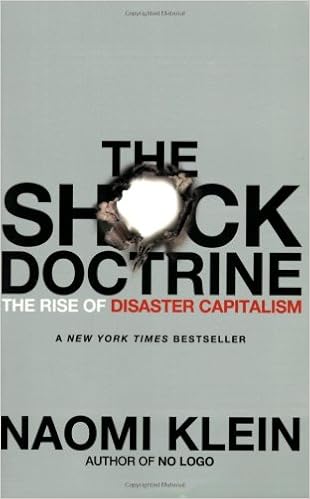The Shock Doctrine - Naomi Klein

Rating 8/10
My Summary:
A fascinating look at how the US’s capitalistic economic models have affected the world. Constantly looking for new markets, the economic machine has the clear goal of making a buck, even at the expense of millions of people. Don’t take advice from economists.
Quotes:
For more than three decades, Friedman and his powerful followers had been perfecting this very strategy: waiting for a major crisis, then selling off pieces of the state to private players while citizens were still reeling from the shock, then quickly making the “reforms” permanent.
By the time Hurricane Katrina hit New Orleans, and the nexus of Republican politicians, think tanks and land developers started talking about “clean sheets” and exciting opportunities, it was clear that this was now the preferred method of advancing corporate goals: using moments of collective trauma to engage in radical social and economic engineering.
What most captured the imagination of Kubark’s authors, more than any individual technique, was Cameron’s focus on regression - the idea that by depriving people of their sense of who they are and where they are in time and space, adults can be converted into dependent children whose minds are a blank slate of suggestibility.
“We’re really good at going out and breaking things. But the day I get to spend more time here working on construction rather than combat, that will be a very good day,” General Peter W. Chiarelli, commander of the U.S. Army’s First Cavalry Division, observed a year and half after the official end of the war.
It was hardly a fair fight: though there were just thirty-six Allende supporters inside, the military launched twenty-four rockets into the palace.
What Argentina’s leaders pulled off in this period was a psychological more than an economic technique. As Cavallo, a junta veteran, well understood, in moments of crisis, people are willing to hand over a great deal of power to anyone who claims to have a magic cure - whether the crisis is a financial meltdown or, as the Bush administration would later show, a terrorist attack.
This points to a nagging and important question about free-market ideologues: Are they “true believers,” driven by ideology and faith that free markets will cure underdevelopment, as is often asserted, or do the ideas and theories frequently serve as an elaborate rationale to allow people to act on unfettered greed while still invoking an altruistic motive?
Corruption has been as much a fixture on these contemporary frontiers as it was during the colonial gold rushes. Since the most significant privatization deals are always signed amid the tumult of an economic or political crisis, clear laws and effective regulators are never in placethe atmosphere is chaotic, the prices are flexible and so are the politicians. What we have been living for three decades is frontier capitalism, with the frontier constantly shifting location from crisis to crisis, moving on as soon as the law catches up.
Lawlessness on the frontier, as Adam Smith understood, is not the problem but the point, as much a part of the game as the contrite hand-wringing and the pledges to do better next time.
“The best time to invest is when there is still blood on the ground,” I was told earnestly by a delegate at the “Rebuilding Iraq 2” conference in Washington, D.C.
Like Russia’s gangsterism and Bush’s cronyism, contemporary Iraq is a creation of the fifty-year crusade to privatize the world. Rather than being disowned by its creators, it deserves to be seen as the purest incarnation yet of the ideology that gave it birth.
If we continue in this direction, the images of people stranded on New Orleans rooftops will not only be a glimpse of America’s unresolved past of racial inequality but will also foreshadow a collective future of disaster apartheid in which survival is determined by who can afford to pay for escape.
Looking ahead to coming disasters, ecological and political, we often assume that we are all going to face them together, that what’s needed are leaders who recognize the destructive course we are on. But I’m not so sure. Perhaps part of the reason why so many of our elites, both political and corporate, are so sanguine about climate change is that they are confident they will be able to buy their way out of the worst of it. This may also partially explain why so many Bush supporters are Christian end-timers. It’s not just that they need to believe there is an escape hatch from the world they are creating. It’s that the Rapture is a parable for what they are building down here a system that invites destruction and disaster, then swoops in with private helicopters and airlifts them and their friends to divine safety.
The truth is at once less sinister and more dangerous. An economic system that requires constant growth, while bucking almost all serious attempts at environmental regulation, generates a steady stream of disasters all on its own, whether military, ecological or financial. The appetite for easy, short-term profits offered by purely speculative investment has turned the stock, currency and real estate markets into crisis-creation machines, as the Asian financial crisis, the Mexican peso crisis and the dot-com collapse all demonstrate.
It is that a steady flow of disasters is now so expected that the ever-adaptable market has changed to fit this new status quo - instability is the new stability.
Washington has always regarded democratic socialism as a greater threat than totalitarian Communism, which was easy to vilify and made for a handy enemy.
Any strategy based on exploiting the window of opportunity opened by a traumatic shock relies heavily on the element of surprise.
Header photo © medium.com
Body photo © amazon.com